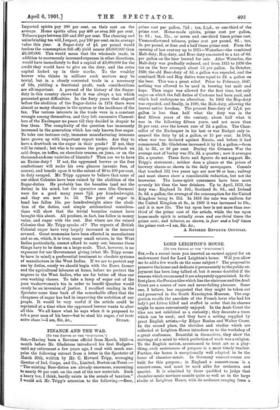• FINANCE AND THE WAR.
[TO THE EDITOR OF THE "SPECTATOR...)
Suz,—Having been a Revenue official from March, 1853—a month before Mr. Gladstone introduced his first Budget— until my retirement a few years ago, I read with much sur- prise the following extract from a letter in the Spectator of March 30th, written by Mr. C. Howard Tripp, managing director of Lid, Coope, and Co., Limited, Burton-on-Trent :— " The existing Beer-duties are already enormous, amounting to nearly 90 per cent. on the cost of the raw materials. Such a. heavy tax, I think, hardly exists in the annals of taxation." I wcaijd ask Mr. Tripp's attention to the following :—Beer, prime cost per gallon, 7d.; tax, 2d., or one-third of the prime cost. Home-made spirits, prime cost per gallon, is. 6d. ; tax, Us., or seven and one-third times prime cost. Unmanufactized tobacco, prime cost per pound, 8d. ; tax, 3s. per pound, or four and a half times prime cost. From the opening of last century up to 1815—Waterloo--the combined Malt-duty, Hop-duty, and Beer-duty amounted to a tax of 6d. per gallon on the beer brewed for sale. After Waterloo, the Malt-duty was gradually reduced, and from 1815 to 1830 the tax on the beer averaged about 5d. per gallon. In October, 1830, the old Beer-duty of 3d. a gallon was repealed, and the combined Malt and Hop duties were equal to 2d. a gallon on the beer. This was a great relief. Prior to February, 1847, nothing was• allowed to be used in brewing but malt and hops. Then sugar was allowed for the first time, but only sugar on which the full duties of Customs had been paid, and which had undergone no alteration. In 1862 the Hop-duty was repealed, and finally, in 1880, the Malt-duty, allowing the brewer entire freedom. The present Beer-duty of 24cd. per gallon is less than half what the duty was in the first fifteen years of the century, about half what it was in the following fifteen years, and not more than 25 per cent. over the lowest rate of 2d. a gallon. The Chan- cellor of the Exchequer in his last or war Budget only creased the duty by id. a gallon, or 15 per cent. In 1854, when war was declared against Russia, and before it had commenced, Mr. Gladstone increased it by id. a gallon,—from 2d. to 3d., or 50 per cent. During the Crimean War the average cost Of barley was 37s. 3d. a quarter; now it averages 25s. a quarter. These facts and figures do not support Mr. Tripp's statement ; neither does a glance at the prices of brewery shares as shown in the daily newspapers. Consols that touched 112 two years ago are now 96 or lees; railway and most shares show a considerable reduction, but not the breweries. The home-spirit consumers have been more severely hit than the beer drinkers. Up to April, 1853, the duty was : England 7s. 10d., Scotland 3s. 8c1., and Ireland 2s. 8d. a gallon, the average of the consumption for the United Kingdom being 4s. 11d. In 1858 the rate was uniform for the United Kingdom at 8s., in 1860 it was increased to 10s., and it is now lie. The tax upon beer is not more than one- third of the prime cost of the article, while the tax upon home-made spirit is actually seven and one-third times the prime cost; and tobacco, as shown, is four and a half times the prime cost.—I am, Sir, &c., A RETIRED REVEN1TS OFFICIAL.






































 Previous page
Previous page